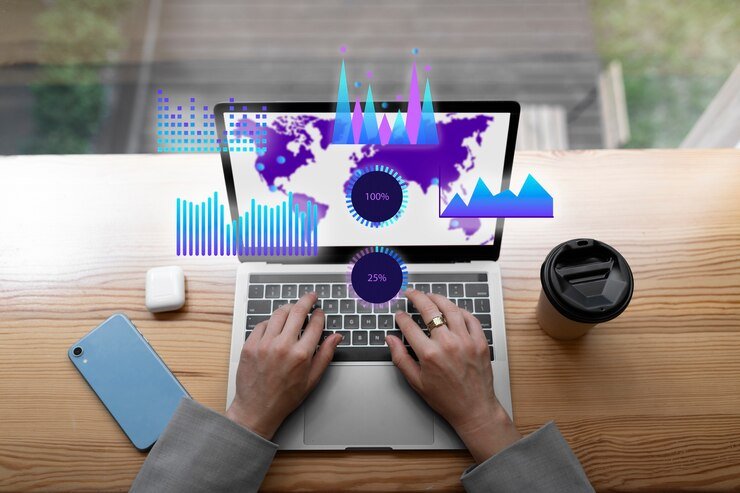
In today’s digital world, your IP address is like a virtual fingerprint. It uniquely identifies your device on the internet and plays a crucial role in how you connect to various online services. But what exactly is an IP address? How does it function behind the scenes of our everyday browsing? If you’ve ever wondered about these questions or simply want to know how do you find your IP address, you’re in the right place. This beginner’s guide will unravel the mysteries of IP addresses and help you understand their significance in our interconnected lives. Whether you’re looking to protect your privacy online or just curious about how things work under the hood, let’s dive into everything you need to know!
What is an IP Address?
An IP address, or Internet Protocol address, is a numeric label assigned to each device connected to a computer network. This unique identifier enables devices to communicate with one another over the internet.
Think of it as your home address for online interactions. Just like mail needs an address to reach you, data packets require an IP address to arrive at their destination.
IP addresses come in two main formats: IPv4 and IPv6. The former is composed of four sets of numbers separated by periods, while the latter features a longer string that includes both numbers and letters.
Every time you access the web or send information online, your device uses its IP address to identify itself. This simple but powerful concept underpins our entire digital experience, enabling seamless communication across vast networks worldwide.
The Different Types of IP Addresses
IP addresses come in two main types: IPv4 and IPv6.
IPv4 is the most common format. It uses a 32-bit number, allowing for approximately 4.3 billion unique addresses. This may seem like plenty, but with the explosion of devices connected to the internet, it’s not enough.
To address this issue, IPv6 was introduced. With its 128-bit structure, it can provide an almost limitless supply of IP addresses—about 340 undecillion (that’s a lot!).
Another distinction lies between static and dynamic IP addresses. Static IPs remain constant over time, essential for servers that need a permanent address for users to find them easily. Dynamic IPs change frequently as they are assigned by your Internet Service Provider (ISP) whenever you connect to the internet.
Understanding these different types helps clarify how devices communicate across networks efficiently.
How to Find Your IP Address
How do you find your ip address is simpler than you might think. You can start by using a search engine. Just type “What is my IP address?” and hit enter. Your public IP will be displayed right at the top of the results.
If you prefer a more hands-on approach, go into your device’s settings. On Windows, open Command Prompt and type `ipconfig`. For Mac users, navigate to System Preferences, then Network.
Mobile devices also have easy options. On Android, look in Settings under Network & Internet; for iOS users, check in Settings > Wi-Fi and tap on the connected network.
For those who want to explore further, there are various websites that show detailed information about both your public and private IP addresses with just one click.
Why is Your IP Address Important?
Your IP address is more than just a series of numbers. It serves as your digital identity on the internet. Every time you connect to a website, your IP address allows that site to know where to send information back.
This unique identifier helps in geolocation. Businesses can tailor content based on users’ locations, enhancing their experience. For instance, you’ll see local news or services when browsing online.
Moreover, it plays a crucial role in security measures. Websites use IP addresses to track user activity and mitigate potential threats like hacking attempts or spam attacks.
In addition, many online services require an IP address for account setup or verification processes. This makes it essential for accessing certain features and functionalities across platforms.
Understanding this importance can empower you with better control over your online presence and privacy settings as well.
The Importance of IP Addresses in Internet Communication
IP addresses play a crucial role in how devices communicate over the internet. Each device connected to a network needs a unique identifier, and that’s precisely what an IP address provides.
When you send data across the web, it travels from your device to another using these identifiers. Without them, information would be lost in transit or misdirected entirely.
Every time you access a website, your request is routed through various servers. These servers use IP addresses to determine where the data should go and which device requested it.
Moreover, they facilitate essential functions like geolocation services. This means businesses can offer localized content based on users’ locations, enhancing user experience significantly.
Understanding how IP addresses work helps demystify internet communication. It reveals the complexities behind seemingly simple online actions we often take for granted.
How IP Addresses are Assigned and Managed
IP addresses are assigned through a structured system governed by organizations like the Internet Assigned Numbers Authority (IANA) and regional Internet registries (RIRs). These entities manage large blocks of IP addresses, distributing them to internet service providers (ISPs) and other organizations.
When you connect to the internet, your ISP allocates an IP address from its pool. This can be dynamic or static. Dynamic addresses change frequently, while static ones remain constant.
The process involves careful management to ensure that every device on a network has a unique identifier. Without this organization, data packets would have nowhere to go. how do you find your ip address?
Each time you access a website or send information online, your device communicates using this assigned address. It’s essential for routing data efficiently across vast networks globally.
The Role of DNS in Connecting IP Addresses to Domain Names
Every time you type a web address into your browser, the magic of DNS kicks in. The Domain Name System translates user-friendly domain names into IP addresses that computers understand.
Without this system, we’d be stuck memorizing long strings of numbers to access our favorite websites. Imagine trying to remember 192.0.2.1 instead of simply typing “example.com.” It would be chaotic.
DNS acts like an internet phone book, linking a human-readable name to its corresponding numerical address. This connection happens almost instantly.
When you hit enter, your device queries a DNS server for that site’s IP address. The server responds with the correct information so you can connect seamlessly.
Understanding this process shows just how crucial DNS is in making the internet accessible and user-friendly for everyone.
Protecting Your IP Address and Privacy Online
Protecting your IP address is crucial in today’s digital age. Cyber threats are everywhere, and every device connected to the internet risks exposure.
One effective way to shield your IP is by using a Virtual Private Network (VPN). A VPN masks your real IP address, making it difficult for anyone to track your online activities.
Be cautious of public Wi-Fi too. These networks are often unsecured, leaving you vulnerable. Always use a VPN when connecting through such channels.
Additionally, consider enabling firewall settings on your devices. Firewalls act as barriers between your network and potential intruders.
Regularly updating software also plays an important role in maintaining security. Outdated applications might have vulnerabilities that hackers can exploit.
Stay informed about privacy policies on websites you visit. Knowing how they handle data can help you make better choices regarding personal information sharing.
Protecting Your Privacy with VPNs
Using a VPN, or Virtual Private Network, is an effective way to safeguard your online privacy. When you connect through a VPN, it encrypts your internet traffic. This means that anyone trying to snoop on your activities will see only scrambled data.
Moreover, a VPN masks your IP address. Instead of revealing your true location, you appear to be browsing from the server’s location. This adds another layer of anonymity while surfing the web.
Many people use VPNs for secure remote access and streaming content unavailable in their region. It’s not just about security; it’s also about accessing more content online.
However, choosing the right provider is crucial. Look for reputable services that prioritize user privacy and don’t keep logs of activity. Your digital footprint matters—take steps to protect it effectively with a reliable VPN solution.
Common Misconceptions about IP Addresses
Many people believe that an IP address reveals everything about a user, including their exact location. While it can provide general information about the city or region, pinpointing someone’s precise whereabouts is often impossible.
Another common myth is that changing your IP address means you’re completely anonymous online. However, while it may disguise your identity to some extent, other tracking methods still exist.
Some also think static and dynamic IP addresses are interchangeable. Static ones remain constant, making them useful for certain tasks like hosting websites. Dynamic addresses change frequently and are more commonly used in home networks.
Many assume only tech-savvy individuals care about IP addresses. In reality, understanding this concept benefits everyone who uses the internet regularly—whether for work or leisure activities.
Conclusion
Understanding your IP address is essential for navigating the online world effectively. Whether you are troubleshooting network issues, enhancing your privacy, or simply curious about how internet communication works, having a good grasp of what an IP address is can be incredibly useful.
Learning about the different types of IP addresses and discovering how to find yours empowers you with knowledge that can enhance your digital experience. The role of DNS in linking domain names to these numeric identifiers adds another layer of complexity worth understanding.
As cyber threats evolve, protecting your IP address becomes increasingly important. Utilizing VPNs can help safeguard your personal information while browsing the web. Awareness of common misconceptions also aids in demystifying this integral part of online connectivity.
By deepening your understanding of how do you find your ip address and their significance, you’ll be better equipped to manage not just your own online presence but also appreciate the broader mechanics at play on the internet today.
RELATED POSTS
View all


